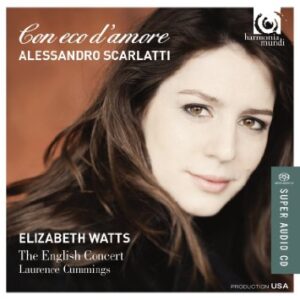Most of Alessandro Scarlatti’s “more than 100” operas lie dormant, an aria or two showing up rarely on Baroque recital CDs. His cantatas are somewhat better known, but still–as this amazingly diverse recital demonstrates–he needs an archeological dig, à la Handel and Vivaldi. And if anyone is going to exhume them, it may be Elizabeth Watts along with conductor Laurence Cummings.
The opening aria, from Griselda, presents a mother’s horror and sadness over her tyrannical son; it sits nicely in the middle of the voice and we might mistake Watts for a light mezzo: a wicked flight up to an enraged high D clarifies that issue. A jealousy aria from Endimione e Cintia is a battle between coloratura and high trumpet and is staggeringly fast and difficult. Yet, lest you think that Watts is in fact just another fine songbird, the following aria, a lilting, lovely Siciliana announcing the birth of the Messiah (“Nacque col Gran Messia”), is sung with such gentleness and exquisite legato that its almost nine-minute length doesn’t quite seem long enough.
Another gentle piece, sung gorgeously on the breath (“Mentr’io godo”) follows, and then all hell breaks loose: “Torbido, irato” from Erminia, which was one of Farinelli’s great showpieces (written for him when he was 17!), dazzles with its sheer number of notes, insane speed, and ferocious leaps.
Rather than list one aria after another, I’ll just observe that as a pure virtuoso Watts may be remarkable, but there are contemporaries who do it better–Julia Lezhneva, for one. Where Watts amazes is with her warmth, the beauty of her sustained quiet singing, her grace, and the astonishing manner in which she keeps a slow melodic arc moving and pure (as in an aria from Tigrane about the whispering breeze). And she sings off the text, fearing not to spit out the words in a very unladylike manner when the situation calls for it.
Laurence Cummings leads this music with great distinction, and the English Concert is at its best, from the solo trumpeter to solo violinist (who really rocks in an aria from Mitridate Eupatore), to the harpsichordist (the only instrument that backs up a call to Cupid from Scipione). Da capos are intelligently embellished. The sound is absolutely transparent, making you aware of Scarlatti’s appealing harmonic peculiarities within a small, perfectly recorded ensemble. Watts and Cummings et al will grab our attention, but the true winner here is Scarlatti, who, I suspect, will gather new fans as a result of this CD.
































